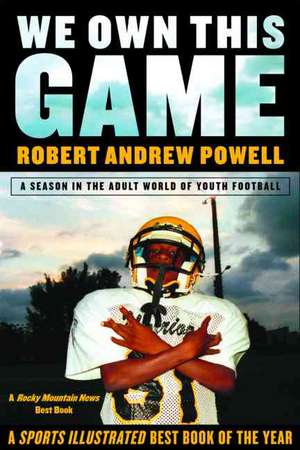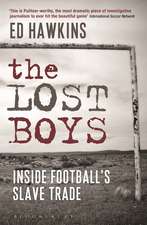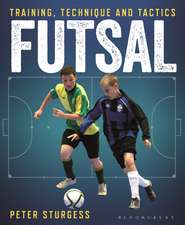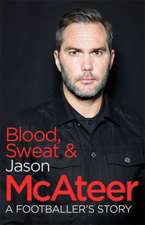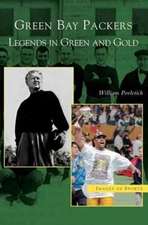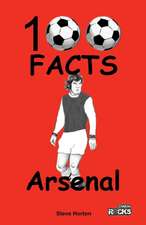We Own This Game: A Season the in the Adult World of Youth Football
Autor Robert Andrew Powellen Limba Engleză Paperback – 31 iul 2004
Although its participants are still in grade school, Pop Warner football is serious business in Miami, where local teams routinely advance to the national championships. Games draw thousands of fans; recruiters vie for nascent talent; drug dealers and rap stars bankroll teams; and the stakes are so high that games sometimes end in gunshots. In America’s poorest city, troubled parents dream of NFL stardom for children who long only for a week in Disney World at the Pop Warner Super Bowl.
In 2001, journalist Robert Andrew Powell spent a year following two young teams through rollercoaster seasons. The Liberty City Warriors, former national champs, will suffer the team’s first-ever losing season. The inner-city kids of the Palmetto Raiders, undefeated for two straight years, are rewarded for good play with limo rides and steak dinners. But their flamboyant coach (the “Darth Vader of youth football”) will be humbled by defeat in a down-to-the-wire playoff game. TITLE OF BOOK is an inside-the-huddle look into a world of innocence and corruption, where every kickoff bares political, social, and racial implications. By an award-winning journalist whose work has appeared in The Best American Sports Writing, it is an unforgettable drama that shows us just what it is to win and to lose in America.
INTRODUCTION
A portrait of Miami, a city whose government, even after race riots which crippled the black community in the 80s, serves the interest mostly of the Cuban-American constituency and has been rocked by various political scandals (bribery, fiscal mismanagement, etc.). The author tells how he witnessed inner-city blacks find hope and identity during a high school football semifinal that was attended by tens of thousands. He takes a newspaper assignment covering Pop Warner football games and sees much he admires (“a depressed community proud that its boys could do something better than anyone else”) but also “the corruption of sport at its infancy” (recruiting, fans assaulting the coach after the team’s only loss, parents living through their kids, gambling, etc.). He quits his job to cover a season of Pop Warner, from the first day to the last game, attending every single season and game of the 95-pound Gwen Cherry Bulls, whose coach is dubbed the ‘Darth Vadar of Pop Warner’.
Prologue
Registration day. Coach Brian Johnson of the Liberty City Warriors is introduced as he prints out ridiculously complicated game strategies for his team, based on the Georgia Southern Eagles game plans. It is his first year as head coach and he is determined to prove himself. “I wouldn’t be a man if I didn’t aspire to run my own team.”
We’re introduced to the “Darth Vadar of Pop Warner” Raul Campos, the ostentatious coach of the 110-pound Palmetto Raiders, who is editing a video hyping his team as the greatest of all time, winners of back-to-back national champions at Disney World Sport Center, undefeated in the last 2 seasons.
We’re introduced to Diamond Pless, a young kid whose uncle was confined to a wheelchair after a shooting with a rival drug dealer, and who is now helping his uncle live his dream of NFL superstardom vicariously
We’re introduced to Mark Peterson, the head of the league who tries without much success to discourage the recruitment of black inner city players to suburban ballparks, and is still torn over last year’s national championship, where a Suniland team made up mostly of recruits won 56-6. The coach lost his job because he ran up the store, but is suing to be reinstated.
CHAPTER ONE: First Practice
The first practice, plus a history of Pop Warner football, the largest youth football league in America, started in 1929 in Philly to prevent youth crime and eventually to over 6,000 teams nationally competing to play in the national champion at Disney World.
CHAPTER TWO: Liberty City
A tour of Liberty City—past the wealthy enclaves of Miami and the poverty of Little Havana is a black neighborhood torn by race riots in the 80s and gang-related assassinations in the 90s. The neighborhood grew out of a black ghetto called Nigger Town which eventually became a progressive experimental black-only community named Knight Manor until a highway ran through it and tore the neighborhood apart. This is wear porno rapper Luther Campbell of 2 Live Crew comes from, who helped found the Liberty City program. Since then, the Warriors have won city championships in 7 of 8 weight divisions and have spawned other all-black parks.
CHAPTER THREE: CAMPOS
Inside the home of the Cuban exile turned real estate wizard Coach Campos, who is hated and called a “cracker” and takes his players to games in chartered motor coaches and used to take them in Hummer limos. After being banned from another Pop Warner team, Campos took over the Palmetto team comprised mostly of white suburban kids and replaced them with mostly black players recruited from West Perrine via varsity letter jackets, steak dinnnnnnners, etc.
CHAPTER FOUR: DIAMOND
Diamond’s mom tries to petition for him to get a larger role on the team, but Diamond doesn’t show much promise. Diamond’s uncle Durell describes his gun injury.
CHAPTER FIVE: SUNILAND
We’re introduced to Phillip, whose father is dead from AIDS and whose HIV+ mother’s behavior is erratic because of drugs. He is often left to his own devices. He sees football as his way out. We’re introduced to the Suniland Devils, a suburban team comprised of recruited back players whose coach Gator Rebhan was banned after he ran up the score in a championship game. Rebhan thinks the League is jealous because he took a white ballpark and made it successful.
CHAPTER SIX: GOULDS
The history of the Railroad Shop, a black settlement that developed nearly a century ago, was condemned by the city, but eventually turned black again. Now Goulds is black and poor. In their first game, Liberty City loses to Goulds, with Coach Johnson’s playbook proving way too complex for the pee wees.
CHAPTER SEVEN: SEPTEMBER 11
Warriors lose their second game. News of 9/11 comes, but Florida is very removed from the goings-on in NYC and Washington. The coaches convene at the field despite cancelled games and try to make sense of things.
CHAPTER EIGHT: McADOO
We’re introduced to shadowy figure named McAdoo, who “takes care” of high school and college players in vague ways. He’s a street agent, of which every major college sports program has at least one. They operate under the radar, even going so far as to buy cars for young players even though he has no traceable source of income besides selling watermelons and gambling. He points out all of the players he “raised”— rappers, NFL players, etc. McAdoo’s cash flow is “supplemented by his relationships with some of Liberty City’s more prominent entrepreneurs,” including drug dealers and gang members. McAdoo has switched his focus from encouraging kids to go into football to encouraging them to read.
CHAPTER NINE: LIBERTY CITY AT PALMETTO
Liberty City is now 1-4 and their chances at the championship are slipping. A player is hit hard and has to go to the hospital in an ambulance. Coach Johnson is questioning why he even bothers.
CHAPTER ELEVEN: PLEX
The story of drug-related gang violence in Liberty City. Gang members bet up to $10,000 and intimidated coaches and player. Diamond’s father-in-law “Plex” was arrested for a murder associated with protecting the distribution channels of a crack laboratory. He is serving 5 life sentences.
CHAPTER ELEVEN: ELECTION
The Elian Gonzalez debacle, and how it further turned the black community against the Cubans. The Warriors win a game.
CHAPTER THIRTEEN: THE GAME
A story about a legendary street game decades ago between a group of white kids and black kids. The black kids
In 2001, journalist Robert Andrew Powell spent a year following two young teams through rollercoaster seasons. The Liberty City Warriors, former national champs, will suffer the team’s first-ever losing season. The inner-city kids of the Palmetto Raiders, undefeated for two straight years, are rewarded for good play with limo rides and steak dinners. But their flamboyant coach (the “Darth Vader of youth football”) will be humbled by defeat in a down-to-the-wire playoff game. TITLE OF BOOK is an inside-the-huddle look into a world of innocence and corruption, where every kickoff bares political, social, and racial implications. By an award-winning journalist whose work has appeared in The Best American Sports Writing, it is an unforgettable drama that shows us just what it is to win and to lose in America.
INTRODUCTION
A portrait of Miami, a city whose government, even after race riots which crippled the black community in the 80s, serves the interest mostly of the Cuban-American constituency and has been rocked by various political scandals (bribery, fiscal mismanagement, etc.). The author tells how he witnessed inner-city blacks find hope and identity during a high school football semifinal that was attended by tens of thousands. He takes a newspaper assignment covering Pop Warner football games and sees much he admires (“a depressed community proud that its boys could do something better than anyone else”) but also “the corruption of sport at its infancy” (recruiting, fans assaulting the coach after the team’s only loss, parents living through their kids, gambling, etc.). He quits his job to cover a season of Pop Warner, from the first day to the last game, attending every single season and game of the 95-pound Gwen Cherry Bulls, whose coach is dubbed the ‘Darth Vadar of Pop Warner’.
Prologue
Registration day. Coach Brian Johnson of the Liberty City Warriors is introduced as he prints out ridiculously complicated game strategies for his team, based on the Georgia Southern Eagles game plans. It is his first year as head coach and he is determined to prove himself. “I wouldn’t be a man if I didn’t aspire to run my own team.”
We’re introduced to the “Darth Vadar of Pop Warner” Raul Campos, the ostentatious coach of the 110-pound Palmetto Raiders, who is editing a video hyping his team as the greatest of all time, winners of back-to-back national champions at Disney World Sport Center, undefeated in the last 2 seasons.
We’re introduced to Diamond Pless, a young kid whose uncle was confined to a wheelchair after a shooting with a rival drug dealer, and who is now helping his uncle live his dream of NFL superstardom vicariously
We’re introduced to Mark Peterson, the head of the league who tries without much success to discourage the recruitment of black inner city players to suburban ballparks, and is still torn over last year’s national championship, where a Suniland team made up mostly of recruits won 56-6. The coach lost his job because he ran up the store, but is suing to be reinstated.
CHAPTER ONE: First Practice
The first practice, plus a history of Pop Warner football, the largest youth football league in America, started in 1929 in Philly to prevent youth crime and eventually to over 6,000 teams nationally competing to play in the national champion at Disney World.
CHAPTER TWO: Liberty City
A tour of Liberty City—past the wealthy enclaves of Miami and the poverty of Little Havana is a black neighborhood torn by race riots in the 80s and gang-related assassinations in the 90s. The neighborhood grew out of a black ghetto called Nigger Town which eventually became a progressive experimental black-only community named Knight Manor until a highway ran through it and tore the neighborhood apart. This is wear porno rapper Luther Campbell of 2 Live Crew comes from, who helped found the Liberty City program. Since then, the Warriors have won city championships in 7 of 8 weight divisions and have spawned other all-black parks.
CHAPTER THREE: CAMPOS
Inside the home of the Cuban exile turned real estate wizard Coach Campos, who is hated and called a “cracker” and takes his players to games in chartered motor coaches and used to take them in Hummer limos. After being banned from another Pop Warner team, Campos took over the Palmetto team comprised mostly of white suburban kids and replaced them with mostly black players recruited from West Perrine via varsity letter jackets, steak dinnnnnnners, etc.
CHAPTER FOUR: DIAMOND
Diamond’s mom tries to petition for him to get a larger role on the team, but Diamond doesn’t show much promise. Diamond’s uncle Durell describes his gun injury.
CHAPTER FIVE: SUNILAND
We’re introduced to Phillip, whose father is dead from AIDS and whose HIV+ mother’s behavior is erratic because of drugs. He is often left to his own devices. He sees football as his way out. We’re introduced to the Suniland Devils, a suburban team comprised of recruited back players whose coach Gator Rebhan was banned after he ran up the score in a championship game. Rebhan thinks the League is jealous because he took a white ballpark and made it successful.
CHAPTER SIX: GOULDS
The history of the Railroad Shop, a black settlement that developed nearly a century ago, was condemned by the city, but eventually turned black again. Now Goulds is black and poor. In their first game, Liberty City loses to Goulds, with Coach Johnson’s playbook proving way too complex for the pee wees.
CHAPTER SEVEN: SEPTEMBER 11
Warriors lose their second game. News of 9/11 comes, but Florida is very removed from the goings-on in NYC and Washington. The coaches convene at the field despite cancelled games and try to make sense of things.
CHAPTER EIGHT: McADOO
We’re introduced to shadowy figure named McAdoo, who “takes care” of high school and college players in vague ways. He’s a street agent, of which every major college sports program has at least one. They operate under the radar, even going so far as to buy cars for young players even though he has no traceable source of income besides selling watermelons and gambling. He points out all of the players he “raised”— rappers, NFL players, etc. McAdoo’s cash flow is “supplemented by his relationships with some of Liberty City’s more prominent entrepreneurs,” including drug dealers and gang members. McAdoo has switched his focus from encouraging kids to go into football to encouraging them to read.
CHAPTER NINE: LIBERTY CITY AT PALMETTO
Liberty City is now 1-4 and their chances at the championship are slipping. A player is hit hard and has to go to the hospital in an ambulance. Coach Johnson is questioning why he even bothers.
CHAPTER ELEVEN: PLEX
The story of drug-related gang violence in Liberty City. Gang members bet up to $10,000 and intimidated coaches and player. Diamond’s father-in-law “Plex” was arrested for a murder associated with protecting the distribution channels of a crack laboratory. He is serving 5 life sentences.
CHAPTER ELEVEN: ELECTION
The Elian Gonzalez debacle, and how it further turned the black community against the Cubans. The Warriors win a game.
CHAPTER THIRTEEN: THE GAME
A story about a legendary street game decades ago between a group of white kids and black kids. The black kids
Preț: 78.18 lei
Nou
Puncte Express: 117
Preț estimativ în valută:
14.96€ • 15.56$ • 12.35£
14.96€ • 15.56$ • 12.35£
Carte disponibilă
Livrare economică 24 martie-07 aprilie
Preluare comenzi: 021 569.72.76
Specificații
ISBN-13: 9780802141538
ISBN-10: 0802141536
Pagini: 208
Dimensiuni: 138 x 210 x 16 mm
Greutate: 0.26 kg
Editura: Grove Atlantic
ISBN-10: 0802141536
Pagini: 208
Dimensiuni: 138 x 210 x 16 mm
Greutate: 0.26 kg
Editura: Grove Atlantic
Descriere
Although its participants are still in grade school, Pop Warner football is serious business in Miami, where local teams routinely advance to the national championships. Games draw thousands of fans; recruiters vie for nascent talent; drug dealers and rap stars bankroll teams; and the stakes are so high that games sometimes end in gunshots. In America's poorest neighborhood, troubled parents dream of NFL stardom for children who long only for a week in Disney World at the Pop Warner Super Bowl.
In 2001, journalist Robert Andrew Powell spent a year following two teams through roller-coaster seasons. The Liberty City Warriors, former national champs, will suffer the team's first-ever losing season. The Palmetto Raiders, undefeated for two straight years, will be rewarded for good play with limo rides and steak dinners. But their flamboyant coach (the "Darth Vader of youth football") will face defeat in a down-to-the-wire playoff game.
We Own This Game is an inside-the-huddle look into a world of innocence and corruption, where every kickoff bares political, social, and racial implications; an unforgettable drama that shows us just what it is to win and to lose in America.
In 2001, journalist Robert Andrew Powell spent a year following two teams through roller-coaster seasons. The Liberty City Warriors, former national champs, will suffer the team's first-ever losing season. The Palmetto Raiders, undefeated for two straight years, will be rewarded for good play with limo rides and steak dinners. But their flamboyant coach (the "Darth Vader of youth football") will face defeat in a down-to-the-wire playoff game.
We Own This Game is an inside-the-huddle look into a world of innocence and corruption, where every kickoff bares political, social, and racial implications; an unforgettable drama that shows us just what it is to win and to lose in America.
